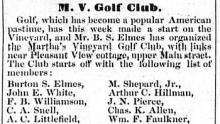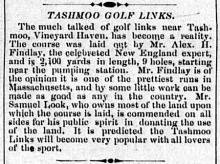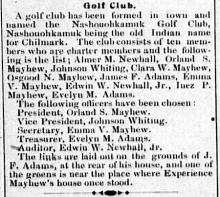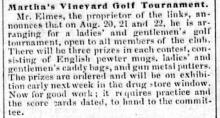The developers who want to build a golf course along the Edgartown Great Pond jacked up the pressure this week in an attempt to gain favorable votes from members of the Martha’s Vineyard Commission.
Opponents of the golf course project also are waging a lobbying campaign, including a series of paid advertisements, but the campaign by the developers is now clearly accompanied by high-pressure tactics more commonly seen in Boston than on the Cape and Islands.
Among other things there is orchestrated pressure coming from high-ranking state officials, including Cape and Islands Sen. Henri Rauschenbach, who telephoned one member of the commission this week to influence his vote in favor of the Meeting House Golf Club.
The Meeting House golf project is planned for some 200 acres of Great Pond land owned by the MacKenty and Bigelow families. The project is one of two golf course developments now under review by the MVC as a development of regional impact (DRI). The public hearing on the Meeting House project closed last month and the commission is now deep in deliberations, with a vote expected on the project sometime in the next two weeks.
The developers of the project are Rosario and Barry Lattuca, a father and son team from Natick. Their partner is Richard Friedman, a Boston real estate developer who owns a seasonal home on Oyster Pond in the coastal perimeters of Edgartown.
The Lattucas attended a fund-raising breakfast for Mr. Rauschenbach last month. Mr. Rauschenbach confirmed yesterday that the Lattucas had made a recent contribution to his campaign, but he could not say how much.
“I can’t remember,” Mr. Rauschenbach said. He said he thought the minimum contribution for the breakfast was about $200.
Mr. Rauschenbach confirmed that he called a member of the commission this week, but he said it wasn’t to lobby for his vote. “I just made one call,” said the senator, who said he had talked about the Meeting House Project with a friend of his who is the former undersecretary of environmental affairs.
“We do have opinions, you know, on some of these things and I just got curious about it and I thought I would poke around a bit,” Mr. Rauschenbach said.
The senator said he thought a golf course might be a better use for the MacKenty property than 30 houses and 30 guest houses. No plan for housing has ever been presented to the commission for the MacKenty land, but the suggestion has been made by the Meeting House group in a recent advertising campaign.
Mr. Rauschenbach could not say exactly how he knew about any proposal for housing on the MacKenty land. “It’s been represented in general that this is an optional use of the property,” he said.
He also could not say how he picked just one member of the MVC to call. “I don’t know, I just had a little list,” he said. Questioned about the “little list,” Mr. Rauschenbach amended his statement, saying he had a list of the entire commission, but he could not say how he picked one person’s name off the list. “I think if you talk to that individual you will find that there was no jamming, no hard sell,” Mr. Rauschenbach said.
“There is a lot of interest on this without a doubt,” the state senator said. “But I don’t think any of this is unusual. It’s just the nature of the beast when you have projects of these types. I don’t think it’s unusual for a person like me to interact a little bit.”
MVC executive director Charles W. Clifford confirmed yesterday that the pressure on members of the commission is now coming from places other than on the street and in the coffee shops of the Islands. “There is pressure coming from other places that is inappropriate,” Mr. Clifford said.
“If you run into someone on the street and have some discussion, that is one thing. But to call people at home to lobby them is inappropriate. I think it is blatant interference with people’s private lives,” Mr. Clifford said.
He said he does not think the pressure tactics have interfered with the MVC deliberation process on the golf course project. “No, the process moves along. But how it affects everything else is in each person’s mind,” he said. “This is a quasi-judicial body. You don’t follow the jury into the jury room to lobby the members during their deliberations.”
Privately, knowledgeable sources said the campaign of pressure is being orchestrated to some degree by Mr. Friedman, a seasoned Boston developer who is a principal in Carpenter & Company Inc. On the Vineyard, Mr. Friedman is best known for loaning his house to President Clinton and his family for their summer vacations.
A silent developer in the golf course project from the start, it is understood that Mr. Friedman has invested an equal share of money in the project with the Lattucas and that he also stands to reap a substantial profit from the development if it is approved. Until recently, Mr. Friedman had remained largely behind the scenes, but in the last month he has begun attending the MVC meetings, along with Peter Diana, who is the senior vice president and general counsel for Carpenter and Company.
A subcommittee of the MVC that is charged with developing a recommendation for the full commission met this week and revealed that it is likely to be a close vote, with sentiment divided nearly down the middle.
Mr. Clifford said the Meeting House developers also attempted to introduce letters after the public hearing was closed. In a report to the MVC last week, staff planners said some of the information that accompanied the golf course plan is incomplete, including a critical monitoring plan for chemical contamination in the ground water and in the pond. The monitoring plan was only submitted in draft form.
Mr. Clifford said the intense lobbying by the Meeting House developers indicates a lack of confidence in their own project and presentation. “It simply says to me, you did not convince the people who are making the judgment that you did what you said you were going to do at the beginning,” he said.









Comments